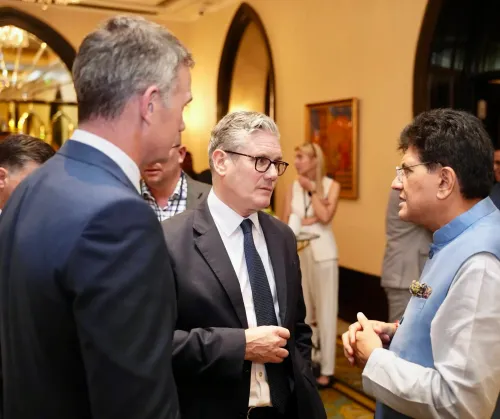Is the ISI Planning a Strike Through Bangladesh-Based Terror Groups?

Synopsis
Key Takeaways
- Intelligence Bureau warns of potential terror threats from Bangladesh.
- Security agencies are on high alert, especially in Northeastern states and West Bengal.
- Political instability in Bangladesh has empowered terror groups.
- ISI is believed to support these groups to execute attacks.
- Illegal immigration routes are a concern for infiltrating terrorists.
New Delhi, Aug 7 (NationPress) As Independence Day approaches, the Intelligence Bureau has raised alarms regarding potential strike attempts by terror groups in multiple regions across the country.
This time, the primary concern arises from Bangladesh, with threats possibly infiltrating through the eastern border, as warned by the Intelligence Bureau.
Security forces in the Northeastern states and West Bengal are urged to maintain a heightened state of vigilance, as terror organizations in Bangladesh may plan attacks on or before Independence Day.
It’s widely recognized that since the leadership of Muhammad Yunus took over, the security situation in Bangladesh has deteriorated significantly, allowing terror groups to operate more freely.
Numerous terror factions have re-emerged amidst a chaotic environment and a regime backed by Jamaat-e-Islami. This has resulted in increased interference from the ISI, which has been deploying operatives to train and assist terror factions.
With recent tensions escalating along the India-Pakistan border due to incidents like the Pahalgam attack and Operation Sindoor, the ISI is likely to redirect its focus towards the eastern front. Intelligence assessments indicate that the ISI aims for a Bangladesh-based group to execute a high-profile attack.
This strategy serves multiple objectives for India: it would create an additional front for attacks and reinvigorate the morale of various terror operatives who have been demoralized by India's recent military actions. Currently, the ISI is grappling with challenges in Pakistan, as multiple terrorists, especially those linked to Jaish-e-Muhammad, are on the defensive. An attack originating from Bangladesh might rejuvenate their operations.
The elevated threat level also stems from the current enthusiasm among Bangladesh's terror factions. Under Sheikh Hasina, these groups were kept under control, but following her removal from power, they have had increased freedom, making it likely that entities like Jamaat-ul-Mujahideen Bangladesh (JMB) are eager to execute a significant attack, a situation that would greatly benefit the ISI.
Furthermore, security agencies are concerned about ongoing illegal immigration into India, as they suspect this could be a pathway for the JMB to infiltrate terrorists. The volatile situation in Myanmar is also a pressing concern for Indian authorities.
The Intelligence Bureau has identified other dangerous groups, including Harkat-ul-Jihadi Islami (HuJI) and Ansarullah Bangla Team (ABT), both of which possess highly trained and lethal operatives. In recent months, the JMB, ABT, and HuJI have seen a resurgence.
However, the foremost threat remains with the JMB, as it has established terror networks in states like Assam and West Bengal.
Indian security officials are leaving nothing to chance. On August 5, five Bangladeshi nationals were intercepted by security personnel near Red Fort, an area that has been closed to the public since July 15. Upon questioning, they confessed their nationality, presented documents, and admitted to entering India illegally. The Intelligence Bureau has also interrogated them but found no immediate threats. Their deportation process has now commenced.









